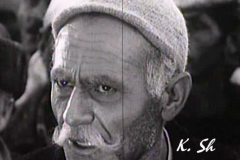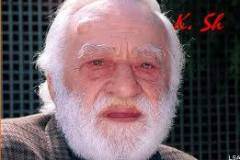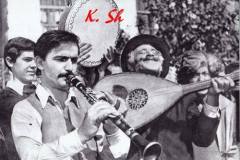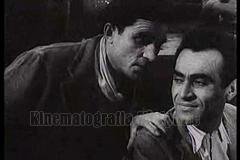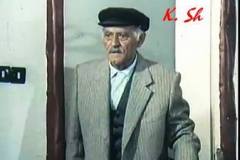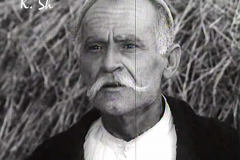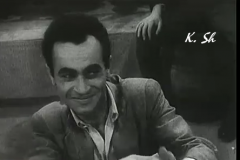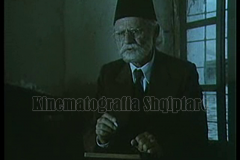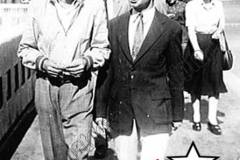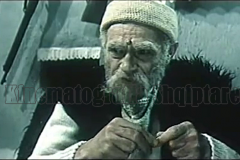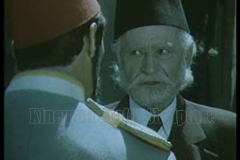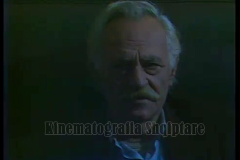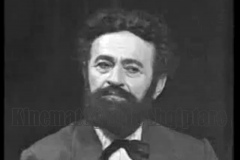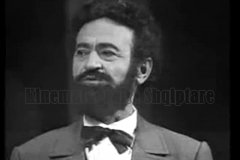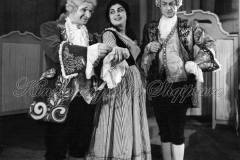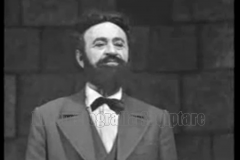Kadri Roshi is as inalienable as eternity itself!
From Baxhul Merkaj
This great master became a school of Albanian acting….
“Art is not a mechanical copy of reality, but its type, growth, perfection”.
This wonderful quote by the artist Roshi is a postulate for all time for young theater artists. As an art critic and researcher following the life and creativity of the “People’s Artist” Kadri Roshi for almost half a century, I had become a friend of his soul. Meetings with this great theater artist have been among the most impressive.
Roshi has never accepted to take out the paper or the pencil or the tape recorder in the communication with him, so the conversations are developed as between two friends. The artist was very wise, he knew well history, psychology, philosophy, but especially theater and film art. So he reached his zenith. He remained inalienable in the figures created in theater or film art…
The respect of our people for this great artist was and remains immeasurable. The artist was always told by his voice, by his soul. His feelings were as magical as his art. There he erupted like a fiery volcano, there he stuttered with wisdom. Roshi brought the vitality of the nation to the stage and has entered every cell of the people with his virtuoso playing.
I see the stage of the National Theater and I remember the conversations I had with him where he got on this stage more than 60 years ago and stayed like an immortal catacomb.
That’s why this theater is named KADRI ROSHI…
Conversation with him…
“Do you see this stage, boy? I used to washe its floor with a cloth!?… But why!?
Out of passion, love for art, even sleep I want to do on stage. Do you knows the secret why I played the role of Arturo Ui at the highest level?
Because I am Albanian, I played the Albanian temperament.
Brecht fled to America and used to say… “I escaped the savagery, the bugs were eating my blood, but I didn’t escape the incompetence of the armchairs that cut my flesh…”.
The biography of the artist Kadri Roshi has points of meeting with the great artists of the stage, who in their beginnings even fell, but the all-powerful passion for art kept them alive.
Kadri Roshi was born in Ballsh on January 4, 1924 and passed away on February 6, 2007, but he was not originally from there, his father and mother were from Libohova, Gjirokastra. Muhim Roshi, Kadri’s grandfather, acted in the drama “Besa” by Sami Frashëri in the city of Ioannina in 1908.
Roshi was orphaned by his mother at the age of 12 and left fatherless at the age of 16. Being an orphan, he started to provide food for his mouth with sacrifices.
He worked as a loading-unloading worker. During the war, he was also imprisoned. Later he worked as a ticket seller at the “Gloria” cinema…
“It was 1945 when I knocked on room 63 at the “Vollga” hotel. I entered and those who were there looked at me curiously.
“I want to become an actor..!”- I said and showed them the passport they had given me from the arts committee.
But they asked if I had graduated from any school and I answered that I had just four primary classes”, the artist remembers.
But Kadri Roshi quickly befriended them and worked willingly and persistently in a course that opened near the “Teatri Popullor”.
After finishing it, the artist immersed himself in readings, going through his mind with dozens and dozens of monologues, even several times, playing himself, where the actor remembers that, working even in front of the mirror, behaving as if he were in front of the public.
To get to the stage for the artist it is not easy. At first he worked as a prompter, until he managed to “steal” and learn the roles by heart.
Entered the competition to participate in the troupe of the “Teatri Popullor”!…
But he failed the exam twice. Not a good omen, but it was a prologue to the birth of the great roles of the actor Roshi.
To be a Demosthenes…?! There was a small cen.
The actor was a little speechless. The will and passion for art made him overcome the limits, every obstacle and thus he became the protagonist of over 100 roles, 80 of them on the stage of the theater and 30 in the cinematography. Roshi had read about the ancient Demosthenes, the orator of Greece who suffered from stuttering and had difficulty delivering speeches.
Therefore, to separate the words, he practiced daily by the river and by the sea, listening to the echo of his voice. And when he appeared in front of the people, he lectured wonderfully.
Artist Kadri Roshi did the same.
Articulating dozens and dozens of vowels and consonants until he became a master of the artistic word. Artist Roshi’s play has been described as a powerful, insightful communicative game. He was an actor in many dramatic, elegiac, satirical plans..
Roshi gave the portrait and voice to dozens of figures of Albanian and world dramaturgy. Abdyl Frashëri penetrated with the language of art into historical truths in Ekrem Kryeziu’s “The Era before the trial”.
His most prominent roles in “Halili and Hajria”, “Revizori”, “Fisherman’s Family”, “Hamlet”, “Aesop”, “Arturo Ui” and many others reveal the features of an actor always in search of outstanding sense of originality and transparency, to perfection. Philosopher Aesop Artist Kadri Roshi is one of the corypheus of the National Theater and is one of the fathers of this very large laboratory of Albanian dramaturgy work.
I closely followed the theatrical performances where one of his most beautiful creations is Aesop in “The Fox and the Grapes”. The two versions of this play, as the first version under the direction of Mihallaq Luarasi, but also the second version staged under the direction of Dhimitër Pecani, Roshi’s play spoke of extraordinary stage phenomena.
His partner in this drama, Margarita Xhepa, expressed…” Together with the artist Kadri Roshi, I played the role of Klea and he of Aesop. Roshi was almighty in playing his roles in theater and cinematography. Roshi is deep in the plastic of the role and especially when he defines the biography of the role. It penetrates into the thinnest threads, where not only the text, but also the subtext came out clearly. His logic was suggestive. He is quite communicative where he discusses the picture at length, discusses the situation and experience with his partner at length. When I worked with him, I felt free. He did not allow himself jokes during rehearsals and was not easily satisfied with what arrived. From performance to performance, he did something new.. He was always focused and with artistic discipline. “But what did the actor feel under the cloak of the philosopher Aesop?…  Roshi himself affirms: “Blessed is he who knows how to sweat at the right time, and thus the beauty of any figure lies in the difficulty of making the figure like yourself.”
Roshi himself affirms: “Blessed is he who knows how to sweat at the right time, and thus the beauty of any figure lies in the difficulty of making the figure like yourself.”
In Aesop, I have done a lot of work regarding the treatment of fables. I used to tell more than 100 fables in rehearsals and on stage. To achieve this I had to learn many other fables to understand who Aesop was. But I learned Aesop in a fable that was not found in the text at all. In it I found the simplicity of telling the fable. The meaning does not need explanations, it is life that helps the professional and artistic culture, whenever it cannot give you a way out.  The rebel “Arturo Ui” In the drama “Arturo Ui” by Bertold Brecht, Roshi gave the figure of the Nazi of the 1930s. This diabolical figure of human society, who sympathized with the macabre qualities that brought havoc to many countries of the world, is interpreted with such pathos , with so much skill, so much dexterity and psychological insight from the stage master Kadri Roshi.
The rebel “Arturo Ui” In the drama “Arturo Ui” by Bertold Brecht, Roshi gave the figure of the Nazi of the 1930s. This diabolical figure of human society, who sympathized with the macabre qualities that brought havoc to many countries of the world, is interpreted with such pathos , with so much skill, so much dexterity and psychological insight from the stage master Kadri Roshi.
For this role, the artist had to study a lot. This caused Roshi to create a very special individuality. Arturo Ui screams, screams, screams, remembering the beast.  The actor played with the voice because then, his voice sounds with pure vibrations. Shakespeare’s “Hamlet” Roshi in “Shakespeare’s Hamlet is expressed”. Playing Hamlet means starting to live with the Middle Ages, with the man of that era, with his mentality and his drama” Kadri’s Hamlet was a different point of view from the one played by the actors Naim Frashëri and Kujtim Spahivogli.
The actor played with the voice because then, his voice sounds with pure vibrations. Shakespeare’s “Hamlet” Roshi in “Shakespeare’s Hamlet is expressed”. Playing Hamlet means starting to live with the Middle Ages, with the man of that era, with his mentality and his drama” Kadri’s Hamlet was a different point of view from the one played by the actors Naim Frashëri and Kujtim Spahivogli.
If Naim was passionate in what he did with “Hamlet”, Kadri was very bitter with a very rich subtext inside. The artist Roshi mastered the second plan in the actor’s action extremely well. Perhaps the subtext, Roshi’s irony is very much pointed out in “Hamlet”.
In the role of Bektash Shkoza.
In terms of tragedy-comedy, Kadri Roshi is indispensable. This is particularly expressed in the realism of the figure of Bektash Shkoza in Dritëro Agolli’s “The Second Face”. Roshi’s Bektash is satirical and comical at the same time.
In both plans, this actor expresses multiplicity in creativity, and this can be seen not only in the role of Bektashi, but also in all other roles. Being a master of the scene “Art is not a mechanical copy of reality, but an interpretation, growth and improvement of it. Real artists pay attention to life, to man.
Recognition is an indispensable need, whenever and wherever. It is like food for the living organism… The actor’s world is enriched only by knowledge and by permanent living experience. Impressions are essential for actors, artists…  These impressions helped him as an orphan in the role of guardian in the movie “Poppies on the Wall”. The stage picture is not something empirical. In it lies the abstraction, the deep reasoning to discover the physiological roots of the artistic image.
These impressions helped him as an orphan in the role of guardian in the movie “Poppies on the Wall”. The stage picture is not something empirical. In it lies the abstraction, the deep reasoning to discover the physiological roots of the artistic image.
The movies!
The artist has always felt the smell of filming in dozens of films, where his interpretative virtuosity stood out. Dozens of roles filmed and never the same. He realized very special types and characters. The artist has always felt himself among ordinary people.
They have become a source of inspiration…
The artist Kadri Roshi is always alive among us with the roles performed as a school of Albanian acting.
An article by Baxhul Merkaj
Illustration with photo by “Albanian Cinematography”
________________________
Actor’s album on Facebook
________________________
Albanian Cinematography in activity since 2013
Follow us too Blog: https://albaniancinematography.blogspot.com/ Facebook: https://www.facebook.com/ksh.faqjazyrtare Dailymotion: https://www.dailymotion.com/kinetografiashqiptareartisporti YouTube: https://www.youtube.com/channel/UCDRYQ5xCyGkfELm3mX8Rhtw
Discover more from Albanian Cinematography - Sport
Subscribe to get the latest posts sent to your email.


